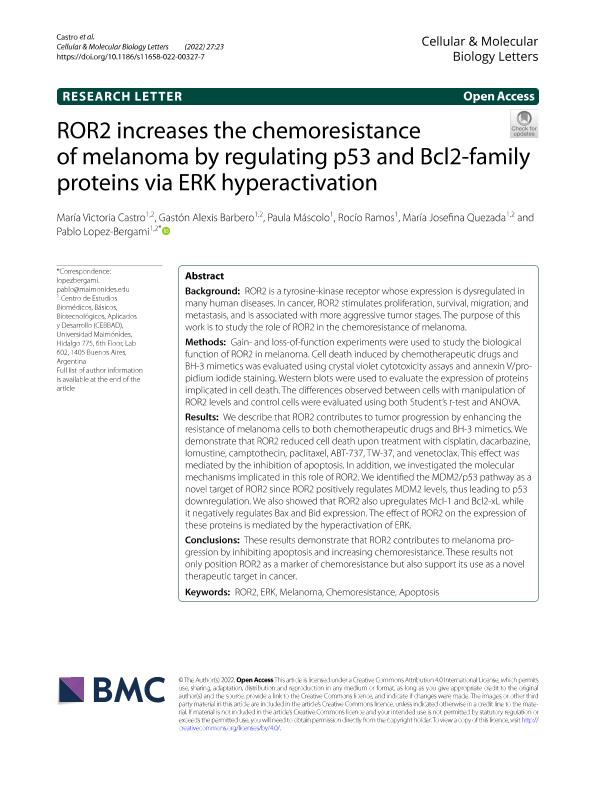Artículo
ROR2 increases the chemoresistance of melanoma by regulating p53 and Bcl2-family proteins via ERK hyperactivation
Castro, María Victoria ; Barbero, Gastón Alexis
; Barbero, Gastón Alexis ; Mascolo, Paula Denise
; Mascolo, Paula Denise ; Ramos, Rocío; Quezada, Maria Josefina
; Ramos, Rocío; Quezada, Maria Josefina ; Lopez Bergami, Pablo Roberto
; Lopez Bergami, Pablo Roberto
 ; Barbero, Gastón Alexis
; Barbero, Gastón Alexis ; Mascolo, Paula Denise
; Mascolo, Paula Denise ; Ramos, Rocío; Quezada, Maria Josefina
; Ramos, Rocío; Quezada, Maria Josefina ; Lopez Bergami, Pablo Roberto
; Lopez Bergami, Pablo Roberto
Fecha de publicación:
03/2022
Editorial:
BioMed Central
Revista:
Cellular & Molecular Biology Letters
ISSN:
1689-1392
Idioma:
Inglés
Tipo de recurso:
Artículo publicado
Clasificación temática:
Resumen
Background: ROR2 is a tyrosine-kinase receptor whose expression is dysregulated in many human diseases. In cancer, ROR2 stimulates proliferation, survival, migration, and metastasis, and is associated with more aggressive tumor stages. The purpose of this work is to study the role of ROR2 in the chemoresistance of melanoma. Methods: Gain- and loss-of-function experiments were used to study the biological function of ROR2 in melanoma. Cell death induced by chemotherapeutic drugs and BH-3 mimetics was evaluated using crystal violet cytotoxicity assays and annexin V/propidium iodide staining. Western blots were used to evaluate the expression of proteins implicated in cell death. The differences observed between cells with manipulation of ROR2 levels and control cells were evaluated using both Student’s t-test and ANOVA. Results: We describe that ROR2 contributes to tumor progression by enhancing the resistance of melanoma cells to both chemotherapeutic drugs and BH-3 mimetics. We demonstrate that ROR2 reduced cell death upon treatment with cisplatin, dacarbazine, lomustine, camptothecin, paclitaxel, ABT-737, TW-37, and venetoclax. This effect was mediated by the inhibition of apoptosis. In addition, we investigated the molecular mechanisms implicated in this role of ROR2. We identified the MDM2/p53 pathway as a novel target of ROR2 since ROR2 positively regulates MDM2 levels, thus leading to p53 downregulation. We also showed that ROR2 also upregulates Mcl-1 and Bcl2-xL while it negatively regulates Bax and Bid expression. The effect of ROR2 on the expression of these proteins is mediated by the hyperactivation of ERK. Conclusions: These results demonstrate that ROR2 contributes to melanoma progression by inhibiting apoptosis and increasing chemoresistance. These results not only position ROR2 as a marker of chemoresistance but also support its use as a novel therapeutic target in cancer.
Palabras clave:
APOPTOSIS
,
CHEMORESISTANCE
,
ERK
,
MELANOMA
,
ROR2
Archivos asociados
Licencia
Identificadores
Colecciones
Articulos(SEDE CENTRAL)
Articulos de SEDE CENTRAL
Articulos de SEDE CENTRAL
Citación
Castro, María Victoria; Barbero, Gastón Alexis; Mascolo, Paula Denise; Ramos, Rocío; Quezada, Maria Josefina; et al.; ROR2 increases the chemoresistance of melanoma by regulating p53 and Bcl2-family proteins via ERK hyperactivation; BioMed Central; Cellular & Molecular Biology Letters; 27; 1; 3-2022; 1-13
Compartir
Altmétricas



